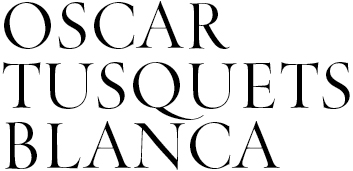Creativity
Luis Racionero. Writer and urbanist. Seu d’Urgell, Lleida, 1940
“Nothing can be created out of nothing” wrote the Epicurean Lucretius, in the sense that after the Big Bang all ‘creation’ is merely a new combination of pre-existing elements. Creation means ordering an increasingly complex hierarchy, whether in literature, music, economics or architecture. There are now more styles, materials and technologies available than there were a hundred years ago; glass and steel have changed the face of the world we live in, a world which once seemed more organic for the simple reason that stone is heavy. / To my mind, the great architect of the 20th century is Frank Lloyd Wright, but he was too good to have a school of disciples. It is much easier to copy Gropius or Mies because rationalism involves repetition of four forms and three proportions; in contrast, Wright represents a subtle ordering of complexity and a respect for the setting. / In my view, Tusquets is the most Wrightian of the European architects, and has taken over as torchbearer from Alvar Aalto, adding a pleasant Mediterranean touch. That Tusquets got on with and understood Dalí so well says much for his intelligence and sense of humour. / Between the excessive order of the rationalists - which leads to monotony, and the conglomerated chaos of the post-moderns - which becomes pastiche, Tusquets has created his own style, a middle way which takes the best of each and whose motto must surely be “avoid boredom”. The style is the man. In his work we find an entertaining creativity, but never superficiality: he has an in-depth knowledge of the history and technique of his profession.







